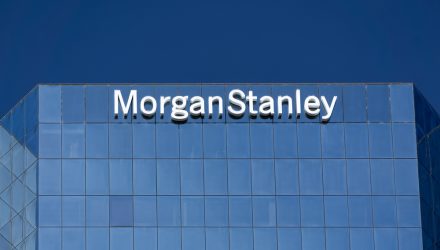With today’s launch of six ETFs, Morgan Stanley is more than the latest sizable asset manager to meet advisors where they are putting client money to work. The move also represents an opportunity to demonstrate there is a persistent demand for ESG ETFs as well as actively managed ones.
While the U.S. ETF industry is now 30 years old, we think the $1.3 trillion Morgan Stanley Investment Management business and its affiliates have strong brands, deep resources, and a commitment to grow an ETF presence with advisors and end retail investors that could help it make inroads.
Three of Morgan Stanley’s new products are ETF versions of Calvert index mutual funds that have generated strong relative returns, while a fourth fund takes a more thematic ESG approach. The firm also launched two actively managed ETFs, one focused on equities and one on fixed income.
Given the resources available to leverage, we expect more actively managed Morgan Stanley ETFs to come to market in the next couple of years. Leveraging Calvert out of the gate makes strategic sense given its 40-year history as a leader in responsible investing and proprietary indexing capabilities. While ESG has become a political football in recent months, we do not expect the Calvert to shy away from seeking competitive returns and positive impact. We are also encouraged that Morgan Stanley is using its scale to bring competitive pricing as ETF-centric advisors and retail investors have many low-cost ESG funds to consider.
The Calvert US Large Cap Core Responsibility Index ETF (CVLC) will be a version of the $3.8 billion Calvert US Large-Cap Core Responsibility Index (CISIX) mutual fund that rose 9.6% on a five-year annualized total return basis as of the end of 2022, ahead of the 9.1% for the Russell 1000 Index.
Meanwhile, the Calvert US Mid-Cap Core Responsibility Index ETF (CVMC) will be a less expensive, more tax-efficient version of the approximately $400 million Calvert US Mid-Cap Core Responsibility Index (CMJIX) mutual fund that climbed 7.7% on an annualized basis over the past five calendar years, ahead of the 7.1% gain for the Russell MidCap Index.
With 0.15% expense ratios, CVLC and CVMC are nine basis points cheaper and more accessible than the institutional share class mutual fund. The price point should put Calvert on the radar for advisors.
For those also seeking diversification benefits, the Calvert International Responsibility Index ETF (CVIE) will be a less expensive version of the $700 million Calvert International Responsibility Index (CHDIX); CVIE’s net expense ratio of 0.18% is 11 basis points less than the mutual fund. Over the past five years, CHDIX increased 2.4%, ahead of the 1.8% gain for the MSCI World Ex-USA Index.
A fourth index fund ETF, the Calvert US Large-Cap Diversity, Equity and Inclusion Index ETF (CDEI), will charge a 0.14% fee, with Morgan Stanley Investment Management making a 0.02% contribution annually to certain diversity, equity, and inclusion initiatives. The fund will invest in companies with a gender-balanced workforce among its board members, executives, management, and employees and/or policies and programs that focus on living wages, health and safety, career development, parental leave, flexible work locations, and schedules, child- care availability, and inclusion of people with disabilities, people who are HIV positive, as well as people who self-identify as LGBTQ+.
The two active ETFs, the Calvert US Select Equity ETF (CVSE) and the Calvert Ultra-Short Investment Grade ETF (CVSB), also began trading today with net expense ratios of 0.29% and 0.24%, respectively. CVSE will invest in large-cap U.S. stocks of companies involved in addressing global environmental or societal challenges based on a combination of qualitative and quantitative research.
Meanwhile, CVSB aims to have an average duration of less than one year primarily through investments in bonds issued by investment-grade U.S. companies, the U.S. government, and its agencies. The fund seeks to invest in issuers that manage ESG risk exposures adequately.
ESG and active ETFs each represent a low single-digit percentage of ETF assets. There is room for growth in both categories as more established firms enter the market, education increases, and a younger generation of investors turn to ETFs instead of mutual funds.
We believe the Calvert brand is widely respected by registered investment advisors. Furthermore, we think retail investors, including those that use E*Trade (owned by Morgan Stanley), are continuing to look toward ETFs that represent their personal beliefs.
Anthony Rochte, global head of ETFs at Morgan Stanley Investment Management, and John Streur, President and CEO of Calvert Research and Management, will be speaking at Exchange about global leadership trends in asset management.
For more news, information, and analysis, visit VettaFi | ETF Trends.
